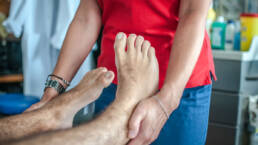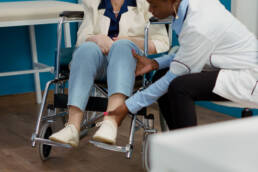Welcome to the Complete Care Chiropractic & Neuropathy Clinic’s comprehensive guide on peripheral neuropathy—a condition that affects millions worldwide, including many in our communities of Owasso, Claremore, Skiatook, Tulsa, Bartlesville, and Collinsville. Whether you’re personally coping with neuropathic symptoms or seeking information for a loved one, understanding this condition and its management is crucial for enhancing quality of life.
At Complete Care, we specialize in holistic approaches to healthcare, focusing on chiropractic care and innovative treatments for neuropathy. Our aim with this guide is to empower you with knowledge about peripheral neuropathy: its causes, symptoms, diagnostic methods, and effective treatments, including chiropractic care.
Peripheral neuropathy refers to damage or dysfunction of peripheral nerves, which connect the brain and spinal cord to the rest of the body. This condition can manifest in various forms, from numbness and tingling sensations to more severe pain and mobility issues. It’s often associated with underlying health conditions such as diabetes, autoimmune disorders, infections, and even certain medications or toxins.
Throughout this guide, we’ll delve into how peripheral neuropathy is diagnosed, traditional and alternative treatment options available, and specific services offered at our clinic that have shown success in managing neuropathic symptoms.
Join us as we explore the transformative potential of chiropractic care and integrated therapies in alleviating the challenges posed by peripheral neuropathy. Whether you’re seeking relief for yourself or a loved one, we’re here to provide clarity, support, and effective solutions.
Stay tuned as we uncover everything you need to know about peripheral neuropathy and how Complete Care Chiropractic & Neuropathy Clinic can help you navigate and manage this condition with confidence and compassion.
Understanding Peripheral Neuropathy
Peripheral neuropathy is a complex condition that involves damage or dysfunction of the peripheral nerves, which are responsible for transmitting signals between the brain, spinal cord, and the rest of the body. These nerves control a wide range of functions, including sensation (such as touch, temperature, and pain), muscle movement, and organ function.
Types of Nerves Affected and Symptoms
Peripheral neuropathy can affect different types of nerves:
- Sensory nerves: These nerves transmit sensations such as pain, touch, and temperature. Damage to sensory nerves can result in numbness, tingling (“pins and needles” sensation), and heightened sensitivity to touch.
- Motor nerves: Motor nerves control muscle movement. Damage can lead to muscle weakness, cramps, and difficulty with coordination and balance.
- Autonomic nerves: These nerves regulate involuntary bodily functions such as heart rate, blood pressure, digestion, and bladder function. Damage may cause symptoms like dizziness upon standing (orthostatic hypotension), gastrointestinal disturbances, and problems with sweating.
Common Causes of Peripheral Neuropathy
Peripheral neuropathy can have various causes, including:
- Diabetes mellitus: High blood sugar levels over time can damage nerves.
- Trauma or injury: Physical trauma, such as from accidents or sports injuries, can lead to nerve damage.
- Autoimmune diseases: Conditions like Guillain-Barré syndrome and lupus can cause immune system attacks on nerves.
- Infections: Certain infections, such as Lyme disease, HIV/AIDS, and hepatitis C, can affect nerves.
- Toxins and medications: Exposure to toxins such as heavy metals (e.g., lead, mercury) or certain chemotherapy drugs can cause neuropathy.
Prevalence and Impact
Peripheral neuropathy is a prevalent condition, with millions of Americans affected. It can significantly impact quality of life due to chronic pain, mobility issues, and complications such as infections or injuries that go unnoticed due to reduced sensation.
Understanding the type of neuropathy and its underlying cause is crucial for effective management and treatment. In the following sections, we will explore how peripheral neuropathy is diagnosed, the importance of early intervention, and the various treatment options available, including the specialized care offered at Complete Care Chiropractic & Neuropathy Clinic.
Causes of Peripheral Neuropathy
Peripheral neuropathy can arise from a variety of underlying conditions and factors. Understanding these causes is essential for both diagnosis and effective treatment.
Common Causes Include
- Diabetes Mellitus: Diabetes is one of the most common causes of peripheral neuropathy. High blood sugar levels over time can damage nerves throughout the body, particularly in the feet and hands.
- Trauma or Injury: Physical trauma, such as accidents, falls, or sports injuries, can directly damage nerves or compress them, leading to neuropathic symptoms.
- Autoimmune Diseases: Conditions like Guillain-Barré syndrome, lupus, rheumatoid arthritis, and others can trigger the immune system to attack the body’s own nerves, causing neuropathy.
- Infections: Certain infections can directly affect nerves, leading to neuropathy. Examples include Lyme disease, HIV/AIDS, hepatitis C, and others.
- Toxins and Medications: Exposure to certain toxins such as heavy metals (e.g., lead, mercury), industrial chemicals, and certain medications (e.g., chemotherapy drugs, antiretrovirals) can damage nerves and lead to neuropathy.
- Genetic Factors: In some cases, peripheral neuropathy can be inherited or genetic predispositions may increase susceptibility to nerve damage.
- Metabolic and Nutritional Disorders: Disorders such as kidney disease, liver disease, vitamin deficiencies (e.g., vitamin B12 deficiency), and thyroid disorders can affect nerve health and contribute to neuropathy.
- Idiopathic Causes: In many cases, the exact cause of peripheral neuropathy may not be identified, leading to idiopathic neuropathy. This underscores the complexity of nerve damage and the need for comprehensive evaluation.
Individual Risk Factors
Certain factors can increase an individual’s risk of developing peripheral neuropathy, including:
- Age: Older adults are more susceptible to nerve damage and neuropathic symptoms.
- Alcohol Abuse: Excessive alcohol consumption can lead to nutritional deficiencies and nerve damage.
- Smoking: Smoking can impair circulation and nerve function, increasing the risk of neuropathy.
- Other Health Conditions: Conditions such as kidney disease, liver disease, and autoimmune disorders can predispose individuals to neuropathy.
Diagnosing Peripheral Neuropathy
Early and accurate diagnosis of peripheral neuropathy is essential for effective management and treatment. At Complete Care Chiropractic & Neuropathy Clinic, we employ comprehensive diagnostic methods to assess and understand the extent of nerve damage and its underlying causes.
Key Steps in Diagnosing Peripheral Neuropathy
Medical History and Physical Examination
- Detailed History: Gathering information about symptoms, medical history (including any underlying conditions or recent illnesses), family history of neurological disorders, medications, and lifestyle factors.
- Physical Examination: Assessing neurological signs such as muscle strength, reflexes, sensation (including touch, temperature, and vibration), and coordination. Examination may include specific tests to identify areas of sensory loss or abnormal sensation.
Neurological Tests
- Nerve Conduction Studies (NCS) and Electromyography (EMG): These tests measure the electrical activity in nerves and muscles, helping to evaluate nerve damage, muscle function, and the speed of nerve conduction.
- Quantitative Sensory Testing (QST): Assessing sensory thresholds to determine changes in nerve function and sensation.
- Autonomic Testing: Evaluating autonomic nerve function through tests such as heart rate variability, sweat tests, and blood pressure responses.
Blood Tests and Laboratory Investigations
- Blood Glucose Levels: Checking for diabetes or impaired glucose tolerance, which can cause diabetic neuropathy.
- Thyroid Function Tests: Assessing thyroid hormone levels, as thyroid disorders can contribute to neuropathy.
- Vitamin and Nutritional Assessments: Screening for deficiencies in vitamins (e.g., B12) or minerals that can affect nerve health.
- Inflammatory Markers and Autoantibodies: Testing for autoimmune diseases or inflammatory conditions that may be causing nerve damage.
Imaging Studies
- Nerve Ultrasound: Imaging technique used to visualize nerves and assess for structural abnormalities or compression.
- MRI (Magnetic Resonance Imaging): Used to evaluate the brain, spinal cord, and peripheral nerves for tumors, herniated discs, or other structural causes of neuropathy.
Biopsy of Nerve Tissue
Skin Biopsy: In some cases, a small biopsy of skin tissue may be performed to evaluate nerve fiber density and diagnose small fiber neuropathy.
Importance of Early Diagnosis
Early diagnosis allows for timely intervention and management of peripheral neuropathy, helping to prevent progression of nerve damage, manage symptoms effectively, and improve quality of life. At Complete Care Chiropractic & Neuropathy Clinic, our multidisciplinary approach ensures thorough evaluation and personalized care plans tailored to each patient’s needs.
In the following sections, we will explore treatment options for peripheral neuropathy, including traditional approaches and specialized chiropractic care offered at our clinic. We are committed to providing compassionate care and comprehensive solutions to help our patients manage and overcome the challenges of peripheral neuropathy.
Traditional Treatments for Peripheral Neuropathy
Peripheral neuropathy management often involves a combination of traditional medical approaches aimed at alleviating symptoms and addressing underlying causes. These treatments are typically prescribed based on the type and severity of neuropathy, as well as individual patient needs.
Common Traditional Treatments Include
Medications
- Pain Relievers: Over-the-counter pain relievers (e.g., acetaminophen, ibuprofen) or prescription medications (e.g., opioids, tramadol) may be used to manage neuropathic pain.
- Antidepressants: Certain antidepressant medications, such as tricyclic antidepressants (e.g., amitriptyline) or serotonin-norepinephrine reuptake inhibitors (SNRIs) (e.g., duloxetine), can help relieve neuropathic pain by affecting chemical messengers in the brain and spinal cord.
- Anticonvulsants: Medications typically used to treat epilepsy (e.g., gabapentin, pregabalin) may also be effective in reducing neuropathic pain by stabilizing nerve cell membranes and reducing abnormal electrical activity.
Physical Therapy
- Exercise Programs: Tailored exercises and physical therapy can improve muscle strength, coordination, and balance, helping to alleviate symptoms and prevent complications.
Topical Treatments
- Lidocaine Patches: These patches contain a local anesthetic that can be applied directly to the skin over the painful area to numb the nerves and provide relief.
- Capsaicin Cream: Derived from chili peppers, capsaicin cream can be applied topically to reduce pain by desensitizing nerve receptors.
Lifestyle Modifications
- Foot Care: Proper foot care is essential for individuals with neuropathy, including daily inspection for cuts or injuries, wearing comfortable shoes, and practicing good hygiene to prevent infections.
- Healthy Diet: A balanced diet rich in vitamins and minerals, including B vitamins (e.g., B12, folate), can support nerve health and overall well-being.
- Smoking Cessation and Alcohol Reduction: Quitting smoking and reducing alcohol consumption can improve circulation and nerve function.
Alternative Therapies
- Acupuncture: This traditional Chinese therapy involves inserting thin needles into specific points on the body to stimulate nerves, muscles, and connective tissue, potentially reducing pain and promoting healing.
- Herbal Supplements: Certain herbs and supplements, such as alpha-lipoic acid and evening primrose oil, have shown promise in managing neuropathic symptoms, although evidence varies and caution should be exercised.
While traditional treatments aim to manage symptoms and improve quality of life for individuals with peripheral neuropathy, they may not address the underlying cause or provide comprehensive relief for all patients. At Complete Care Chiropractic & Neuropathy Clinic, we offer a holistic approach that integrates traditional medical treatments with specialized chiropractic care and innovative therapies to address the root causes of neuropathy and provide effective, personalized care.
In the next sections, we will delve into the role of chiropractic care in managing peripheral neuropathy and explore the specific treatments and services available at our clinic. We are committed to empowering our patients in Owasso, Claremore, Skiatook, Tulsa, Bartlesville, and Collinsville to achieve optimal nerve health and overall well-being.
Chiropractic Care for Peripheral Neuropathy
Chiropractic care offers a non-invasive and holistic approach to managing peripheral neuropathy, focusing on optimizing nerve function, reducing pain, and improving overall quality of life. At Complete Care Chiropractic & Neuropathy Clinic, we specialize in chiropractic techniques that are tailored to address the specific needs of patients with neuropathic symptoms.
Benefits of Chiropractic Care for Peripheral Neuropathy
Spinal Adjustments
Improving Nerve Communication: Chiropractic adjustments aim to correct spinal misalignments (subluxations) that may compress nerves or interfere with their proper function. By restoring spinal alignment, chiropractors help improve nerve communication and reduce neuropathic symptoms.
Peripheral Joint Adjustments
Enhancing Joint Mobility: Adjustments to peripheral joints, such as those in the arms and legs, can enhance joint mobility, alleviate stiffness, and reduce inflammation, which may contribute to neuropathic pain.
Nerve Mobilization Techniques
Promoting Nerve Health: Chiropractors may use specialized techniques to mobilize and stretch nerves gently, helping to improve their flexibility, reduce tension, and enhance blood flow to affected areas.
Corrective Exercises and Rehabilitation
Strengthening Muscles: Customized exercise programs and rehabilitation techniques help strengthen muscles around affected nerves, improving stability, coordination, and overall function.
Nutritional Counseling
Supporting Nerve Health: Chiropractors often provide nutritional counseling to optimize nerve health through a balanced diet rich in essential vitamins, minerals, and antioxidants. Specific supplements may also be recommended to support nerve function.
Lifestyle Modifications
Addressing Contributing Factors: Chiropractors work with patients to identify and address lifestyle factors that may exacerbate neuropathic symptoms, such as poor posture, improper ergonomics, and stress.
Case Studies and Patient Testimonials
Demonstrating Effectiveness: Many patients have experienced significant improvements in neuropathic symptoms through chiropractic care at Complete Care Chiropractic & Neuropathy Clinic. Case studies and testimonials highlight successful outcomes, showcasing the clinic’s dedication to patient-centered care and results.
Chiropractic care offers a holistic and integrative approach to managing peripheral neuropathy, focusing on improving nerve function, reducing pain, and enhancing overall well-being. At Complete Care Chiropractic & Neuropathy Clinic, we combine chiropractic adjustments with specialized therapies and personalized treatment plans to address the unique needs of each patient.
In the following sections, we will explore specific neuropathy-specific treatments offered at our clinic, including low-level laser therapy (LLLT), electrical stimulation techniques, and nutritional counseling. These innovative therapies complement chiropractic care and contribute to comprehensive, effective management of peripheral neuropathy. We invite you to discover how our holistic approach can help you or your loved ones achieve relief and regain quality of life.
Neuropathy-Specific Treatments Offered at Complete Care Chiropractic & Neuropathy Clinic
At Complete Care Chiropractic & Neuropathy Clinic, we offer a range of specialized treatments designed specifically to address peripheral neuropathy. These innovative therapies aim to reduce pain, improve nerve function, and enhance overall quality of life for our patients in Owasso, Claremore, Skiatook, Tulsa, Bartlesville, and Collinsville.
Specialized Treatments Include
Low-Level Laser Therapy (LLLT)
- Mechanism: LLLT utilizes low-intensity lasers or LEDs to stimulate cellular activity, promote tissue repair, and reduce inflammation. It is effective in improving nerve function and alleviating neuropathic pain.
- Benefits: Non-invasive, painless treatment that enhances circulation, reduces pain and inflammation, and accelerates healing of damaged nerves.
Rebuilder
- Wakes up dormant nerve cells: Restores normal polarity along the nerve axons and dendrites, helping nerves transmit signals properly again.
- Relaxes and re-energizes shrunken nerve cells: Increases blood flow and oxygen to the synaptic junctions between nerves, providing nutrients for nerve repair.
- Stimulates muscles along with nerves: Uses twin electrical signals to cause muscle contractions and relaxations, further increasing blood circulation.
- Induces endorphin release: Encourages the brain to release endorphins, reducing pain and improving well-being.
How does the ReBuilder work?
- Stimulates both nerves and muscles to provide pain relief.
- Activates the venous muscle pump in the calf, increasing blood flow and circulation, which removes de-oxygenated blood cells and toxins while bringing healthy blood back to the feet.
Benefits of Electronic Muscle Stimulation
- Increases blood flow
- Improves balance
- Eliminates local pain
- Eliminates global pain through endorphin release
Nutritional Counseling and Supplements
- Role of Nutrition: Proper nutrition is crucial for nerve health. Our chiropractors provide personalized nutritional counseling to ensure patients receive essential vitamins, minerals, and antioxidants that support nerve function and overall well-being.
- Supplements: Recommendations may include vitamins B12, B6, and D, as well as alpha-lipoic acid and omega-3 fatty acids, known for their neuroprotective and anti-inflammatory properties.
Lifestyle Modifications and Pain Management Strategies
- Education and Guidance: Empowering patients with knowledge about lifestyle factors that can exacerbate neuropathic symptoms, such as diet, exercise, posture, and stress management.
- Pain Management: Integrative approaches to managing neuropathic pain include chiropractic adjustments, therapeutic exercises, and relaxation techniques to enhance pain relief and improve quality of life.
Patient-Centered Approach
- Individualized Care Plans: Tailored to each patient’s unique needs and preferences, ensuring comprehensive treatment that addresses the root causes and symptoms of peripheral neuropathy.
- Monitoring and Adjustments: Continual assessment of progress and adjustment of treatment plans as needed, ensuring optimal outcomes and patient satisfaction.
At Complete Care Chiropractic & Neuropathy Clinic, we are dedicated to providing compassionate care and effective solutions for peripheral neuropathy. Our specialized treatments, including LLLT, nutritional counseling, and comprehensive lifestyle recommendations, aim to address the underlying causes and symptoms of neuropathy while promoting long-term nerve health and well-being.
In the next sections, we will explore patient success stories and provide practical tips for managing neuropathy symptoms at home. We invite you to discover how our holistic approach can make a positive difference in your journey towards better health and restored function.
Lifestyle Changes and Home Care
Managing peripheral neuropathy involves more than just clinical treatments. Lifestyle changes and home care practices can play a crucial role in alleviating symptoms, preventing further nerve damage, and improving overall quality of life. At Complete Care Chiropractic & Neuropathy Clinic, we empower our patients with practical advice and strategies to manage neuropathy effectively at home.
Key Lifestyle Changes and Home Care Practices
Healthy Diet
- Balanced Nutrition: Consuming a diet rich in vitamins, minerals, and antioxidants is essential for nerve health. Include a variety of fruits, vegetables, whole grains, lean proteins, and healthy fats in your meals.
- Specific Nutrients: Focus on nutrients that support nerve function, such as vitamin B12, B6, and D, as well as magnesium and omega-3 fatty acids. Foods like leafy greens, fish, nuts, seeds, and fortified cereals are excellent choices.
- Hydration: Staying well-hydrated is important for overall health and can help maintain optimal nerve function.
Regular Exercise
- Physical Activity: Engage in regular exercise to improve circulation, muscle strength, and flexibility. Low-impact activities such as walking, swimming, and yoga can be particularly beneficial for individuals with neuropathy.
- Strength Training: Incorporate strength training exercises to enhance muscle support and stability, which can reduce pressure on nerves and improve mobility.
Foot Care
- Daily Inspection: Examine your feet daily for cuts, blisters, or sores, especially if you have diabetic neuropathy. Early detection and treatment of injuries can prevent complications.
- Proper Footwear: Wear well-fitting, supportive shoes that protect your feet from injury. Avoid tight shoes and high heels that can cause pressure points.
- Hygiene: Keep your feet clean and dry to prevent infections. Trim toenails carefully and moisturize your feet to prevent dryness and cracking.
Stress Management
- Relaxation Techniques: Practice relaxation techniques such as deep breathing, meditation, and progressive muscle relaxation to reduce stress and manage pain.
- Mindfulness: Mindfulness practices can help you stay present and manage chronic pain more effectively.
Avoiding Toxins
- Limit Alcohol: Excessive alcohol consumption can worsen neuropathy. Limit or avoid alcohol to protect nerve health.
- Quit Smoking: Smoking impairs circulation and can exacerbate neuropathic symptoms. Seek support to quit smoking and improve overall health.
Pain Management Strategies
- Heat and Cold Therapy: Applying heat or cold packs to affected areas can help alleviate pain and reduce inflammation. Use with caution and avoid extreme temperatures.
- Over-the-Counter Medications: Non-prescription pain relievers like acetaminophen or ibuprofen can help manage mild pain. Consult with your healthcare provider before use.
Ergonomic Adjustments
- Workstation Setup: Ensure your work environment is ergonomically designed to reduce strain on your body. Adjust chairs, desks, and computer screens to promote good posture and comfort.
- Assistive Devices: Use assistive devices such as ergonomic keyboards, wrist supports, or special footwear to alleviate pressure on nerves and improve daily functioning.
Implementing lifestyle changes and home care practices can significantly contribute to managing peripheral neuropathy and improving your overall well-being. At Complete Care Chiropractic & Neuropathy Clinic, we support our patients with comprehensive guidance and resources to help them take control of their health and live more comfortably with neuropathy.
Empowering You to Manage Peripheral Neuropathy
Peripheral neuropathy can be a challenging condition, but with the right knowledge, treatment, and support, it is possible to manage symptoms and improve quality of life. At Complete Care Chiropractic & Neuropathy Clinic, we are committed to providing comprehensive, patient-centered care to the communities of Owasso, Claremore, Skiatook, Tulsa, Bartlesville, and Collinsville.
Through this guide, we have explored the complexities of peripheral neuropathy, from its causes and diagnosis to traditional and chiropractic treatments. We have highlighted the benefits of our specialized therapies, including low-level laser therapy, electrical stimulation, nutritional counseling, and lifestyle modifications. Our holistic approach aims to address both the symptoms and underlying causes of neuropathy, promoting long-term nerve health and overall well-being.
We believe in empowering our patients with practical advice and strategies for managing neuropathy at home. By making informed lifestyle changes, engaging in regular exercise, practicing good foot care, and managing stress, you can take proactive steps toward better nerve health.
At Complete Care Chiropractic & Neuropathy Clinic, we are dedicated to ongoing education and community support. We strive to create a supportive environment where patients can access the resources and care they need to thrive. Whether you are seeking relief for yourself or a loved one, our team is here to guide you on your journey to improved health.
If you are experiencing symptoms of peripheral neuropathy, we encourage you to reach out to our clinic for a consultation. Our experienced chiropractors and healthcare professionals are ready to develop a personalized treatment plan tailored to your unique needs. Together, we can help you achieve relief, regain function, and enhance your quality of life.
Thank you for reading our ultimate guide to peripheral neuropathy. We invite you to contact Complete Care Chiropractic & Neuropathy Clinic today to start your path to better nerve health and well-being. Let us partner with you in your journey toward a healthier, more comfortable life. Contact us today.

Ready for an expert opinion? Get in touch today!
Harmonize your health naturally by embracing one or a blend of these chiropractic Essentials. Our tailored chiropractic services are designed to guide you towards your individual journey of transformation. Begin your health transformation today with Complete Care Chiropractic.
Like this article? Spread the word!
Related Posts
May 15, 2025
Expert Spinal Care & Neuropathy Treatment in Owasso | Chiropractor for Peripheral Neuropathy
Looking for expert spinal care and effective pain relief in Owasso? Complete Care…
February 12, 2025
Understanding Neuropathy: What You Need to Know for Better Health
Experience effective, non-invasive relief from neuropathy at Complete Care Chiropractic &…
January 14, 2025
Discover Relief with Complete Care Chiropractic & Neuropathy in Owasso, OK
Experience expert chiropractic care with Dr. Ballard at Complete Care Chiropractic &…





